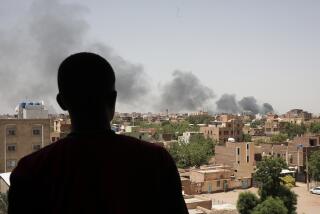U.S. Must Do More to Heal Rift: Mubarak : Egyptian Meets With Reagan Envoy Today; Indicates Cooperation
- Share via
CAIRO — On the eve of his meeting with a U.S. diplomatic trouble-shooter, President Hosni Mubarak said Sunday that the United States must do more than it has to restore ties with Egypt to the friendly level that existed before American warplanes forced an Egyptian airliner carrying the Achille Lauro ship hijackers to land in Sicily earlier this month.
“I am an Egyptian, and I can feel what the people in the streets feel,” Mubarak told reporters during an inspection tour of villages in southern Egypt. “The United States needs to exert more efforts for this wound to heal.”
Noting that both sides were hurt by the Achille Lauro affair, Mubarak added that Egypt also will make a “greater effort” to resolve the crisis. Diplomatic observers here saw this comment as a sign that the Egyptian leader may have quietly dropped his demand that President Reagan apologize publicly for the U.S. action.
U.S. Emissary
Mubarak is to meet today with Deputy Secretary of State John C. Whitehead, whom Reagan sent to Italy and Egypt late last week with the special mission of trying to halt swift deterioration in official U.S. relations with the two countries. The setback to relations stemmed from American moves to try to bring the hijackers and their accused director, all of them Palestinians, to justice.
In Italy, where the government of Prime Minister Bettino Craxi collapsed in the Achille Lauro aftermath, Whitehead delivered a “particularly friendly” letter from the President that was accepted by Craxi.
In Rome on Sunday, diplomatic and political observers credited the letter with making it more likely that Craxi will be asked this week to form a new government among members of the same coalition that formed his old one.
Sees Foreign Minister
Whitehead arrived in Egypt on Saturday night and Sunday conferred for nearly three hours with Foreign Minister Esmat Abdel Meguid, first at the Foreign Ministry and later over a long lunch. Afterward, officials from both sides expressed hope that the diplomatic crisis had peaked.
In his talk with reporters in the south, Mubarak dismissed the notion that his decision to leave Cairo on an inspection tour, rather than to meet promptly with Whitehead upon his arrival, was a snub to the American envoy, as some diplomats had suggested.
“He (Whitehead) knew perfectly well before he came here that I was busy Saturday and Sunday,” Mubarak said.
Neither Whitehead nor Meguid spoke to reporters after their Sunday meeting, keeping to an agreement made by both that no statements would be issued until after Whitehead’s meeting today with Mubarak. But a U.S. official described the talks as “useful,” adding that efforts to mend relations were “moving along quite nicely.”
The Egyptian side appeared to concur. “It is the duty now of both sides to calm down this crisis because it is in both our interests to restore normal relations as soon as possible,” said Gihad Madi, Meguid’s spokesman.
Most analysts say that won’t be easy, however, because of the deep anger and humiliation still felt by most Egyptians over the airliner episode and the jubilant fashion in which it has been celebrated in the United States.
“What has happened will not be forgotten easily,” said Ali Dessouki, a prominent political scientist at Cairo University. “It is widely perceived by Egyptians of all persuasions as an insult to national pride and an unexpected humiliation from what had been perceived as a friendly country.”
Even as Whitehead met with Meguid, riot police patrolled Cairo’s restless university campuses, quickly snuffing out several attempts to organize anti-American demonstrations, witnesses said.
Although the demonstrations held on the campuses during the last week have been relatively small, two of them ended in the bloodiest clashes between police and protesters since food riots here in 1977. This in turn has shocked Egyptians and contributed to a feeling that the diplomatic crisis with Washington must be contained before it evolves into a serious domestic one.
Mubarak did not spell out the extra “efforts” he expects from the United States to effect an improvement in the situation. But Egyptian officials have said that Cairo wants Washington to take urgent steps to help save a Jordanian-Palestinian peace initiative that appears to be all but dead.
Salvaging that initiative, which Egypt strongly supports, would not only improve Washington’s battered image in the Arab world but would bolster Mubarak’s position, at home and abroad, by vindicating his alliance with the United States, officials here have suggested.
Madi, the Foreign Ministry spokesman, described the setbacks suffered by the peace process as critical and said the Reagan Administration must take the lead in reversing them.
“We have been working on the other Arabs. We have been telling them that the Americans are working for peace and that they should work for it too. But what can we say to them now? We are in a very critical situation,” he said.
More to Read
Sign up for Essential California
The most important California stories and recommendations in your inbox every morning.
You may occasionally receive promotional content from the Los Angeles Times.













